|
|
Welcome to |
|
|
Welcome to |
BIOGRAPHIES
Source:
A Centennial Biographical History
of
Seneca County,
Ohio
Publ. by Lewis Publishing Company
1902
< CLICK
HERE TO RETURN TO
1902 BIOGRAPHICAL INDEX >
< CLICK HERE TO RETURN TO LIST OF
BIOGRAPHICAL INDEXES >
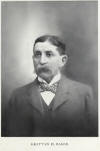 Grattan H. Baker |
GRATTAN H.
BAKER
Source: A Centennial
Biographical History of Seneca County, Ohio - Publ. by Lewis Publishing
Company - 1902 - Page 680 |
|
HENRY
BALBIAN. The city of Tiffin, Ohio, is the home of some of the
most flourishing industries of Seneca county, and the place of residence
of those whose energy and ability control these enterprises. One of
the leading business citizens of Tiffin is Henry Balbian,
whose connection with the Tiffin Woolen Mills has existed since 1899, and
he is a worthy representative of that class of large-brained, progressive
and public-spirited men without whose business acumen and advanced ideas
many lines of trade would become entire inactive. By birth Mr. Balbian is a German, his residence in the United States dating from the day of the assassination of President Garfield, in 1881. He was born in Rhein-Pfalz, Bavaria, Germany, Mar. 13, 1860, and was given good educational opportunities, studying for a time in an academy in Heidelberg. His father, Gustave Balbian, is a native of the same place, and still resides there, at the age of eighty years, venerable and respected. For a long period he was a prominent and prosperous woolen manufacturer, and it was in his father's mills that our subject acquired his thorough knowledge of the manufacture of woolens. When Mr. Balbian reached the city of New York he was but twenty years old, but he was already a skilled workman and very soon he entered upon a business engagement in Lisbon Falls, Maine, where he was superintendent of mills, at a salary of five thousand dollars a year, this connection lasting for four years. His next business association was in Philadelphia, where he managed a large mill for six years, leaving there to assist in the starting of a new plant at Louisville, Kentucky, which he successfully and satisfactorily managed for the succeeding three years. In the fall of 1892 he returned to the north and became the manager of a mill at North Vassalboro, Maine, remaining with that concern until 1897, when he went to Cleveland, Ohio, there taking charge of the largest plant of its kind in America. The fertile brain of Mr. Balbian was continually busy, seeking out new methods, projecting new plans and preparing for a permanent future for himself. In 1898, in connection with his brother Frederick, he bought the Vassar Woolen Mills and the electric-light plant in Vassar, Michigan, this large enterprise now being under the superintendency of Frederick Balbian. Mr. Balbian still had expansive ideas, and in 1899 he came to Tiffin, Ohio, and considered the advisability of purchasing the old Tiffin Woolen Mills, a plant which had been idle for some years. Mr. Balbian, with the business ability which has always distinguished him, finally determined to take charge of this plant, which formerly had not been successfully conducted, and to put in improved machinery, apply his own enlightened methods of management and to endeavor to make this a valuable and paying property. This he has done, and now the industry is one of the leading ones of the city, employing a very large force of workmen and attracting a great volume of trade. The output of the plant consists of all classes of woolen goods, and in connection with the mills Mr. Balbian conducts a large tailoring establishment. His methods are practical, because he is a practical man. He understands every detail of his work and knows just where to expand and where to economize and still to keep his goods up to the standard he has led the trade to expect. Henry Balbian was married on Oct. 3, 1882, to Miss Lena Ellen Batz, who was born in Connecticut, and they have three daughters, namely: Lillian May, Lena Ellen and Anna Matilda, all well educated young ladies and fitted for the best social circles in Tiffin. Mr. Balbian was reared in the Lutheran Church, and his wife is a member of the Protestant Episcopal church. In politics he votes more for the man than in the interests of any party, while fraternally he is a member of the Knights of Pythias and has attained the thirty-second degree in Masonic order. Mr. Balbian is one of the substantial citizens of Tiffin, and his beautiful home, on Milmore Street, is the center of a genial hospitality. He is liberal and public-spirited and takes pride in the progress of this city being ever ready to assist in all enterprises which promise to be of benefit. He is recognized as a leader in all matters of business, and is always at home where shrewdness, and clear-headedness and sound judgment are brought into play. As manager of the Tiffin Woolen Mills he has shown his ability and skill, having a large capacity for work himself, and possessing those qualifications which enable him to manage large forces of men without friction. Source: A Centennial Biographical History of Seneca County, Ohio - Publ. by Lewis Publishing Company - 1902 - Page 662 |
|
| THOMAS
BLAIR. Thomas Blair, who is engaged in general
farming in Seneca township, is numbered among Ohio's native sons, for
his birth occurred near New Lancaster on the 1st of January, 1816.
More than eighty-five years have passed since that time and great
changes have occurred in the Buckeye state. It has long since
ceased to be a "western" state, for progress and civilization have moved
far beyond the Mississippi. Its wild lands have been reclaimed and
transformed into fertile farms, towns and villages have sprung up and
some of the most extensive business interests of the country have been
established within its borders. Mr. Blair has taken a deep
interest and just pride in what has been accomplished here, and at all
times in a quiet but loyal way he has supported the measures and
movements which he believed to be for the general good. His parents, John and Rachel (Wilson) Blair, were honored pioneer settlers of Ohio and in 1824 they came with their family to Seneca county, taking up their abode in Seneca township, living upon the Indian reserve for a few years. Mr. Blair afterward entered eighty acres of land from the government and erected a hewed-log house. His land was covered with heavy timber and it required persistent and hard work to clear it and make it ready for the plow. As the years passed, however, great changes occurred in the appearance of the farm, which became a very attractive tract of land. The father of our subject made his home thereon until his death, which occurred when he was seventy-five years of age, while his wife had reached the age of seventy years, she dying but five days after him. They were the parents of seven children: William, who died at sixty-five; Rachel, who married John Swaney and died at seventy-five; Thomas, the subject of this review; James, a resident of Iowa; and John, who resides in Wood county; Alexander died a young man; and Andrew died at about sixty. In taking up the personal history of Thomas Blair we present to our readers the life record of one who is widely and favorably known in Seneca county, his residence here covering more than three-fourths of a century. He was a little lad of only eight years when he arrived in Seneca township and for a few years thereafter his playmates were the children of the Mohawk Indian tribe. He became thoroughly familiar with the Mohawk tongue and greatly enjoyed the sports of his Indian friends. He never had any trouble with them and expresses strongly the opinion that there is more honor among the red race than is often found among the white men. All the experiences and trials of pioneer life were familiar to him, as well as pleasures of a character that are unknown at the present day. When nineteen years of age he entered upon an independent business career, hiring out to clear land, and from that time forward he has depended entirely upon his own resources for all that he has enjoyed in the way of material comforts. Mr. Blair was first married in 1840, the lady of his choice being Mary Sailor, by whom he had five children: John W., who lives in Montana; Thomas J., a resident of Gratiot county, Michigan; Rhoda, the widow of Benjamin Clay, of Adrian, Ohio; Jeremiah, who also resides in Montana; and Samuel, who died at thirty-two. After the death of his first wife Mr. Blair was again married, his second union being with Miss Elizabeth Spitler, by whom he also had five children, as follows: Joseph, who makes his home in Montana; Mary, the wife of Joseph M. Conoway, of Virginia; Grace, who married John Fruth; Frank, at home; and Amanda, who married Albert Fruth. At the time of his marriage Mr. Blair had but one horse and his financial resources were very limited. He erected a log cabin on the farm where he now resides, the primitive home containing but one room. Long since, however, it has been replaced by a commodious modern residence, and good barns and outbuildings have been added and all desirable improvements made. He owns one hundred and twenty acres of land, which be cleared and improved, making the place a rich and arable tract, the fields yielding to him a golden tribute in reward for his labor. For many years he has served as school director and has ever taken a deep and attaching interest in all that pertains to intellectual development. As one of the honored pioneers of the county, he justly deserves representation in this volume. His memory forms a connecting link between the primitive past and the progressive present and few men now living in Seneca county are better informed concerning its history when Ohio was a frontier state than is Thomas Blair, whose reminiscences of the early days are most interesting. Source: A Centennial Biographical History of Seneca County, Ohio - Publ. by Lewis Publishing Company - 1902 - Page 443 |
|
| DAVID
BOYD. One of the venerable pioneers and honored
citizens of Seneca county is Mr. Boyd, who is now living
retired from active business, after a long life of signal industry and
well directed endeavor. His career has been characterized by an
inflexible integrity of purpose and he has ever commanded the fullest
measure of esteem in the community where he has passed so many years of
his life, his home being in Jackson township. Mr. Boyd claims the old Keystone state as the place of his nativity, having been born in Perry county, Pennsylvania, on the 22d of February, 1822. He was reared and educated in his native county and when fourteen years of age entered upon an apprenticeship at the blacksmith trade. After attaining maturity he removed to Cumberland county, where he was employed at his trade for a period of two years. He then set forth for Ohio, making the trip on foot and locating in Richland county, where he remained one year, at the expiration of which time he came to Seneca county and established his home in Jackson township, where he has ever since resided. He at one time owned a farm of three hundred and sixty acres, but has disposed of this property with the exception of one acre, where he has maintained his home from the time when he first located in the township. Upon locating here he established a blacksmith shop, and here he continued in the active work of his trade until 1891, when he retired. His services were in demand by a large circle of patrons, and he is well known to the people of this section of the county. In 1844 Mr. Boyd was united in marriage to Miss Rosana Weiser, who was born in Cumberland county, Pennsylvania, on the 9th of February, 1822, and they became the parents of five children, namely: Hugh W. A., who is engaged in farming in this township and who served as a valiant soldier during the war of the Rebellion, having enlisted, in June, 1863, as a private in Company C, Eighty-sixth Ohio Volunteer Infantry, with which he served six months, the regiment having been in pursuit of Morgan on his famous raid and having participated in the engagement at Cumberland Gap. On the 2d of May, 1864, Mr. Boyd re-enlisted, becoming a member of the One Hundred and Sixty-fourth Ohio Volunteer Infantry, in the one hundred days’ service, being assigned to duty in the defense of the national capital. After the expiration of his second term Mr. Boyd returned to his home, and in October, 1864, he again tendered his services to the Union, becoming a member of Company G, One Hundred and Eighty-third Ohio Volunteer Infantry, which was with General Thomas in the Franklin and Nashville campaign, and in this regiment he served until the close of the war, when he received his honorable discharge and was duly mustered out. He retains a vital interest in his old comrades in arms and is prominently identified with the Grand Army of the Republic, being a member of Norris Post, at Fostoria, of which he has ever served as commander. Jacob H. C. Boyd, the second son of our subject, was likewise a soldier in the Civil war, having served for seven months in the One Hundred and Eighty-sixth Ohio Volunteer Infantry, and he is now a successful farmer of his township. John A. S., Benjamin F. and David I. died in early childhood. In politics Mr. Boyd is a stanch Republican, and he has served as trustee of his township. His religious faith is that of the Methodist Episcopal church, of which he has been a member since 1848, his wife also being a devoted member of the same. Mr. Boyd has eleven oil wells on his place and the same are being- profitably operated. He has attained prosperity through his own well directed efforts, and in the evening of his life enjoys the due reward of his active and useful career. Source: A Centennial Biographical History of Seneca County, Ohio - Publ. by Lewis Publishing Company - 1902 - Page 629 |
|
| LEVI BOYD. Within the confines of Seneca county will be found many
successful and honored business men who are of the second generation of
their families to have become prominently identified with the industrial
activities of this favored section of the Buckeye commonwealth, and such
is true in the case of Levi Boyd, who is a native son of
the county and who has here passed his entire life, being now numbered
among the influential and prosperous farmers of Jackson township and a citizen who commands the confidence and esteem of the community where he has lived and labored to goodly ends. Mr. Boyd was born on the homestead farm in Jackson township, on the 12th of November, 1846, being one of the ten children of William and Eliza (Dick) Boyd, and one of the five sons who still survive, namely: Sarah E., the wife of David Wirick, of Jerry City, Wood county; Eli W., of Jackson township, Seneca county; and Edwin D., Ellis, and our subject, also residents of this township. William Boyd was born in Perry county, Pennsylvania, about the year 1816, and as a young man he emigrated to Ohio, locating in Seneca county, where for a number of years he devoted his attention to making shingles, crossties, etc., all the work being accomplished by hand. Later he purchased forty acres of heavily timbered land in Jackson township, reclaiming the same to cultivation and eventually adding to his possessions until he had a good farm of one hundred and eighty acres, the greater portion of which was cleared under his personal direction. Here he continued to maintain his home until his death, in 1891, when he passed away in the fullness of years and well earned honors. His original political affiliations were with the Whig party, but he joined the Republican party at the time of its organization and ever continued to give it his support. He was a devoted and active member of the Reformed church, as is also his wife, who was born in Pennsylvania, about 1822, and who still maintains her home on the old farm. Levi Boyd early became inured to the various duties of the farm, and his educational privileges were such as were afforded in the public schools of the locality. Upon attaining his legal majority he assumed charge of the homestead, which he worked on shares, and thus continued until one year after his marriage, in 1868, when he removed to his present fine farm, which was then the property of his father-in-law. After operating the place for two years he purchased forty acres adjoining it on the south, and there maintained his abode until 1890, when he purchased eighty-four acres of his father-in-law, simultaneously removing to the same and also purchasing forty acres lying contiguous on the east. In recent years he has made some changes, and his farm now comprises one hundred and twenty-six acres, well improved and under most effective cultivation. He has given his attention to diversified farming and has been very successful in his operations. In politics Mr. Boyd has given an unswerving allegiance to the Republican party, and he served six years as trustee of his native township, where he is held in the highest regard by all who- know him. He is a member of the Canaan United Brethren church and is serving on its board of trustees, being treasurer of the same and also holding the office of steward in the church, in whose work, as in all that concerns the general welfare, he maintains a deep interest. Aug. 19, 1868, Mr. Boyd was united in marriage to Miss Melissa J. Long, who was born on the farm which is now his home, the daughter of Benjamin L. Long, one of the representative pioneers of this township. Mrs. Boyd was summoned into eternal rest in the year 1890. leaving three children,—Fdsie R., now the wife of Charles Nichols, of this township; Benjamin F., who remains at the paternal home; and Margaret M., the wife of J. B. Stein, of Morgantown, West Virginia. Feb. 28, 1893, Mr. Boyd was married to Mrs. Mary (Bloom) Sprout, who was likewise born in this county, being the daughter of William Bloom, one of the well-known business men of Fostoria, and widow of Daniel Sprout. Source: A Centennial Biographical History of Seneca County, Ohio - Publ. by Lewis Publishing Company - 1902 - Page 477 |
|
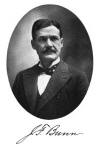 J. F. Bunn |
JACOB FREDERICK BUNN.
It is not an easy task to adequately describe the character of a man who
has led an eminently active and busy life in connection with the great
profession of the law and who has stamped his individuality on the plane
of definite accomplishment in one of the most exacting fields of human
endeavor; and yet there is always a full measure of satisfaction in adverting, in even a casual way, to the career of an able and conscientious lawyer. Mr. Bunn merits consideration for what he has accomplished as a member of the bar of his native state and his native county, and also for the inflexible integrity which has characterized him as a man among men. Judge Bunn is recognized as a man of high intellectual gifts and of thorough and comprehensive knowledge of the science of jurisprudence, while the prestige which he has acquired has come as the result of his own efforts and abilities. He is the senior member of the firm of Bunn & Royer, attorneys and counselors at law in the city of Tiffin, and formerly presided as judge of the probate court of this, his native county. Jacob Frederick Bunn was born on the old homestead farm, in Thompson township, Seneca county, Ohio, on the 6th of June, 1847, and is a representative of one of the early pioneer families of this section of the state. His father, Jacob Bunn, was born in the state of Pennsylvania, where he was reared and educated, growing up on a farm. There his marriage occurred, and in 1833 he came with his wife to the primitive wilds of Seneca county, purchasing a tract of land in the oak openings of Thompson township, where he reclaimed a good farm, upon which he passed the greater portion of his remaining days, having lived retired in Bellevue during the last decade of his life. He passed away at the age of seventy-six years. He was a Democrat in his political proclivities, and his religious faith was that of the Reformed church. He held the office of justice of the peace for a number of years and also served as captain of a company of state militia in the early days. He was a son of John Bunn, who was born in Pennsylvania, in 1767, and who came to Seneca county, Ohio, the same year as did his son. He settled in Thompson township and there remained until his death, at the venerable age of eighty years. The family is of English extraction, the original American ancestors having come here in the early colonial epoch, while the name finally became prominent in the annals of Pennsylvania. The mother of Judge Bunn was likewise born in Pennsylvania, her maiden name having been Elizabeth Leiter and the family being of Holland Dutch derivation. She accompanied her husband on his removal to Seneca county, and here her death occurred, in 1886, at the age of seventy-eight years. She likewise was a devoted member of the Reformed church and was a woman of noble Christian grace and character. Judge Bunn, the immediate subject of this review, grew up on the old homestead farm and early began to contribute his quota toward its work, in the meantime securing his preliminary educational training in the public schools. When about nineteen years of age, ambitious for further educational privileges, he entered Heidelberg College, in Tiffin, where he completed a full course of study, being graduated as a member of the class of 1870. To a man of such individuality and tenacity of purpose it was natural that definite plans, for the future should be formulated, and thus, after leaving college, we find Judge Bunn continuing the study of law, his reading having been carried on during vacations, while he was still a student in the college. His preceptor was Judge George E. Seney, to whom individual reference is made elsewhere in this work; and such has been his devotion to his technical study that he secured admission to the bar of the state in 1871. In the spring of that year he located in the city of Akron, where he was engaged in practice for a period of two years, at the expiration of which he returned to Tiffin, where he built up a very satisfactory professional business, giving the same his undivided attention until 1878. He was elected to the bench of the probate court of Seneca county, in that year, being re-elected in 1881 and thus serving for six years in this important office, to whose duties lie brought the best of equipment, mature judgment, a broad and exact knowledge of the law and the highest regard for justice and equity. After his retirement from the bench, Judge Bunn resumed the active practice of his profession, becoming at the same time associated with Hon. John C. Royer, who continued his coadjutor until his election to the same office which had previously been held by his associate. After the expiration of his service the association was resumed and the partnership continues to the present time. In his political adherency Judge Bunn has ever been stanchly arrayed in support of the principles and policies of the Democratic party, but he has never been an office-seeker. He was a member of the board of education for six years, and was clerk of the same for a portion of this time. Fraternally he is a member of the Benevolent Protective Order of Elks. The Judge is signally appreciative of good literature in all lines, and is thoroughly well read in fields outside that of his profession, upon which latter, in fact, all branches of human knowledge have distinct bearing. He is unassuming and affable in his demeanor and has gained many stanch friends in the community where practically his entire life has been passed. On the 10th of October, 1873, Judge Bunn was united in marriage to Miss Laura Groff, who was born in Tiffin, the daughter of Hezekiah Groff, and whose death occurred on the 12th of July, 1880. Source: A Centennial Biographical History of Seneca County, Ohio - Publ. by Lewis Publishing Company - 1902 - Page 128 |
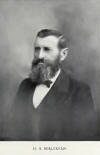 H. B. Berlekemp |
H. BERNHARDT BERLEKEMP.
Source: A Centennial Biographical History of Seneca County, Ohio - Publ. by Lewis Publishing Company - 1902 - Page 160 |
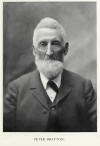 Peter Brayton |
PETER BRAYTON Source: A Centennial Biographical History of Seneca County, Ohio - Publ. by Lewis Publishing Company - 1902 - Page 600 |
 David W. Brown & Susanna Brown George Brown |
DAVID W. BROWN
Source: A Centennial Biographical History of Seneca County, Ohio - Publ. by Lewis Publishing Company - 1902 - Page 568 |
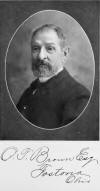 O. T. Brown |
OWEN T. BROWN Source: A Centennial Biographical History of Seneca County, Ohio - Publ. by Lewis Publishing Company - 1902 - Page 272 |
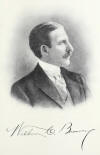 Wilbur C. Brown |
WILBUR C. BROWN
Source: A Centennial Biographical History of Seneca County, Ohio - Publ. by Lewis Publishing Company - 1902 - Page 288 |
|
HENRY BYERS.
As one reviews the history of the county and looks into the past to see
who were prominent in its early development he will find that through a
long period the name of Byers has been closely connected with the
progress and advancement of this section of the state. For many
years Henry Byers, of this review, has been a resident of
Seneca county. Wild was the region into which he came when a boy
of fourteen years, and from that early period he has been prominently
identified with the history of the community. A native son of the Buckeye state, his birth occurred in Stark county, Feb. 20, 1838, a son of Jacob and Nancy (McLoughlin) Byers. The father was born in Frederick county, Maryland, but when a boy he came with his father, John Byers, to Stark county, Ohio, where the latter entered land from the government. Wild was the region at that early day. Its forests stood in their primeval strength, the prairie land was still unbroken, and the Indians roamed through the dense woods, seeking the game which could be had in abundance. There the son Jacob grew to years of maturity, and after his marriage he settled down to the quiet and peaceful life of a farmer. About 1852 he removed to Seneca county, purchasing eighty acres of land, which now forms a part of our subject’s present farm, and there he spent his remaining days on earth, passing away at the age of eighty-three years. In early life he gave his political support to the Democracy, but later he became identified with the Republican party, and his religious preference was indicated by his membership in the Presbyterian church. Of his eight children only three now survive, - Jeremiah S., a prominent farmer of Jackson township, Seneca county; Eliza, the wife of Isaac Cook, of Grattan, Michigan; and Henry, the subject of this review. The latter grew to years of maturity on his father’s farms in Stark and Seneca counties, and to their public schools he is indebted for the educational advantages which he received in his youth. When the trouble between the north and the south threw the country into civil war he nobly put aside all personal considerations, and in 1862 became a member of Company K, One Hundred and First Ohio Volunteer Infantry, which was assigned to the Army of the Cumberland. With his regiment he took part in the battles of Perryville and Murfreesboro, but at the latter engagement he was wounded and taken prisoner. After a confinement of three weeks in Libby prison he was paroled and sent to the hospital at Annapolis, thence to the parole camp and later to Camp Chase, where he was ordered, after being exchanged, to join his regiment at Bridgeport, Alabama. Mr. Byers participated in all the battles in which his regiment took part excepting that of Chickamauga, and at the close of hostilities he was mustered out of service, receiving an honorable discharge in June, 1865, after which he returned to his home and again assumed the management of the homestead farm, which had been his task since his sixteenth year. Two years after returning from the war he was married, bringing his bride to the old family homestead, and after his father’s death, in the early '80s, he purchased the place. Prior to this time he had also become the owner of a forty-acre tract adjoining, and thus his landed possessions were increased to one hundred and twenty acres, where he is now extensively engaged in general farming. He is a business man of much more than ordinary ability, and his unremitting toil and close attention to business throughout his active career have been the means of winning for him the handsome competence which is to-day his. The marriage of Mr. Byers was celebrated in 1867, when Miss Susanna Stainbrook became his wife. She, too, claimed Ohio as the state of her nativity, her birth having occurred in Muskingum county. They became the parents of four children, but two of the number, Fannie J. and Margaret E., have passed away in death, at eighteen and thirteen respectively, and the two surviving ones are Sarah E. and Arthur E., both at home. The loving wife and mother has joined her children in the spirit world, having closed her eyes in death in 1888. Mr. Byers gives his political support to the Republican party, but, although he is a public-spirited and progressive citizen to a marked degree, has never been a seeker after political preferment. For many years he was a member of the Methodist Episcopal church, but that congregation afterward disbanded, and he has never since allied his interests with any denomination, although he is a constant attendant at divine worship. His social relations connect him with Ash Post, G. A. R., at Kansas, this county, in which he holds pleasant relations with his old army comrades of the “blue.” Source: A Centennial Biographical History of Seneca County, Ohio - Publ. by Lewis Publishing Company - 1902 - Page 494 |
|
CLICK HERE to
Return to SENECA COUNTY, OHIO |
CLICK HERE to
Return to OHIO GENEALOGY EXPRESS |
|
GENEALOGY EXPRESS This Webpage has been created by Sharon Wick exclusively for Genealogy Express ©2008 Submitters retain all copyrights |
|